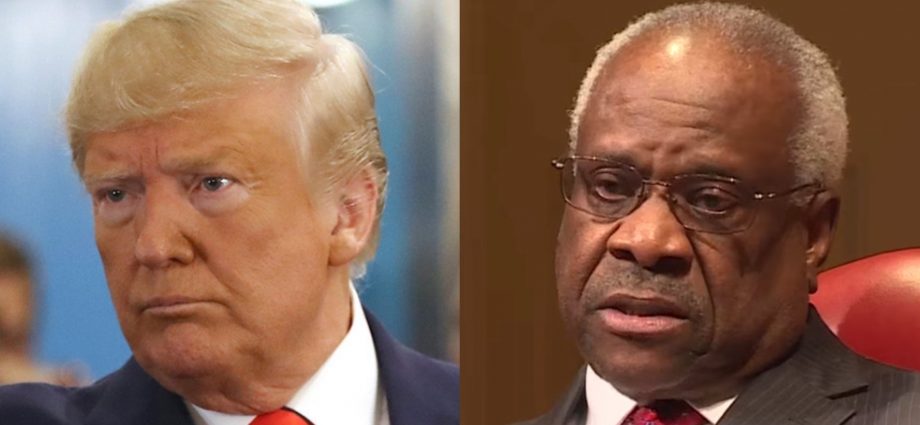Today the Supreme court dismissed the Trump case as moot since Donald Trump no longer holds office and Twitter has already blocked him from the platform. The case questioned whether or not Trump had the right to block people on Twitter. Clarence Thomas agreed with the ruling to dismiss the case as moot and added his opinion.
Twitter User @Sodangfancy100 tweets, “Clarence Thomas is about to destroy Twitter.” in response to Mark Joseph Stern tweet, “Clarence Thomas suggests that social media companies may NOT have a First Amendment right to regulate speech on their platforms, analogizing them to “common carriers” and “places of public accommodation.”
Clarence Thomas is about to destroy Twitter. https://t.co/kiipZqBT7Z
— Kristin (@Sodangfancy100) April 5, 2021
Thomas highlights Trump’s limited control of his account writing, “Donald Trump, then President of the United States,
blocked several users from interacting with his Twitter account. They sued. The Second Circuit held that the comment threads were a “public forum” and that then-President Trump violated the First Amendment by using his control of the Twitter account to block the plaintiffs from accessing the comment threads. Knight First Amdt. Inst. at Columbia Univ. v. Trump, 928 F. 3d 226 (2019). But Mr. Trump, it turned out, had only limited control of the account; Twitter has permanently removed the account from the platform.”
Thomas Continues, “I write separately to note that this petition highlights the principal legal difficulty that surrounds digital platforms—namely, that applying old doctrines to new digital platforms is rarely straightforward. Respondents have a point, for example, that some aspects of Mr. Trump’s account resemble a constitutionally protected public forum. But it seems rather odd to say that something is a government forum when a private company has unrestricted authority to do away with it.”
He then gets to Twitter’s terms of service, “The disparity between Twitter’s control and Mr. Trump’s control is stark, to say the least. Mr. Trump blocked several people from interacting with his messages. Twitter barred Mr. Trump not only from interacting with a few users, but removed him from the entire platform, thus barring all Twitter users from interacting with his messages.1 Under its terms of service, Twitter can remove any person from the platform—including the President of the United States—“at any time for any or no reason.” Twitter Inc., User Agreement (effective June 18, 2020).”
Thomas addresses the powerful avenue that Social Media giants are when it comes to connecting with constituents and that eventually, the court will have to step in on how exactly the legal doctrine applies, “Today’s digital platforms provide avenues for historically unprecedented amounts of speech, including speech by government actors. Also unprecedented, however, is the concentrated control of so much speech in the hands of a few private parties. We will soon have no choice but to address how our legal doctrines apply to highly concentrated, privately owned information infrastructure such as digital platforms.”
Toward the end of his, commentary Thomas writes, “If part of the problem is private, concentrated control over online content and platforms available to the public, then part of the solution may be found in doctrines that limit the right of a private company to exclude…First, our legal system and its British predecessor have long subjected certain businesses, known as common carriers, to special regulations, including a general requirement to serve all comers. Candeub, Bargaining for Free Speech…
Justifications for these regulations have varied. Some scholars have argued that common-carrier regulations are justified only when a carrier possesses substantial market power. Candeub 404. Others have said that no substantial market power is needed so long as the company holds itself out as open to the public... And this Court long ago suggested that regulations like those placed on common carriers may be justified, even for industries not historically recognized as common carriers, when “a business, by circumstances and its nature, . . . rise[s] from private to be of public concern.
But whatever may be said of other industries, there is clear historical precedent for regulating transportation and communications networks in a similar manner as traditional common carriers. Candeub 398–405. Telegraphs, for example, because they “resemble[d] railroad companies and other common carriers,” were “bound to serve all customers alike, without discrimination.” Primrose v. Western Union Telegraph Co., 154 U. S. 1, 14 (1894).2 In exchange for regulating transportation and communication industries, governments—both State and Federal—
have sometimes given common carriers special government favors. Candeub 402–407. For example, governments have
tied restrictions on a carrier’s ability to reject clients to “immunity from certain types of suits”3 or to regulations that
make it more difficult for other companies to compete with the carrier (such as franchise licenses).”
The Supreme Court decided Twitter banning the President of the United States made the whole argument moot. This show of power highlights to Justice Thomas that they will need to take action at some point. From his comments, it looks like he believed the Social Media giants may need to be classified as Utilities unfortunately it won’t be at this time. As Thomas concludes with, “The extent to which that power matters for purposes of the First Amendment and
the extent to which that power could lawfully be modified raise interesting and important questions. This petition,
unfortunately, affords us no opportunity to confront them.”
- Sources: Tim Pool Sold Operation to The Daily Wire - December 17, 2024
- Jack Smith BTFO After Judge Cannon Denies Gag Order Request on Donald Trump - May 28, 2024
- Nancy Pelosi Refuses to Answer Directly the Question of Whether or Not Donald Trump is Still ‘Eligible’ to be President in Midst of State Ballot Fiascos - January 7, 2024

